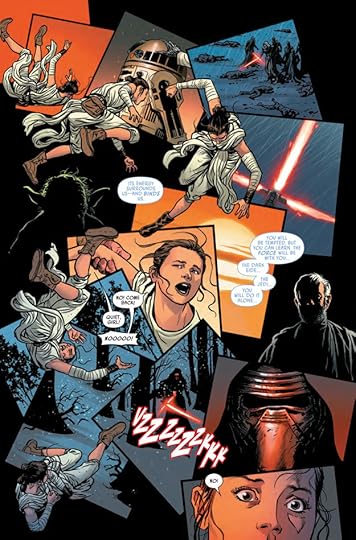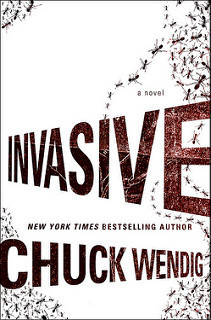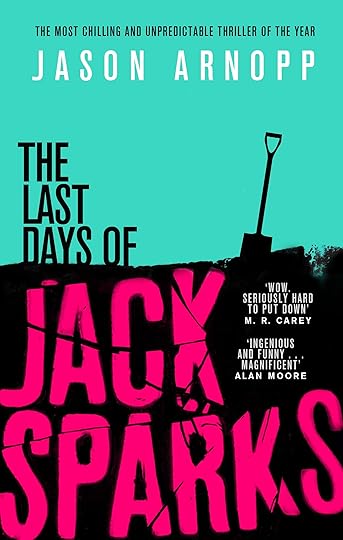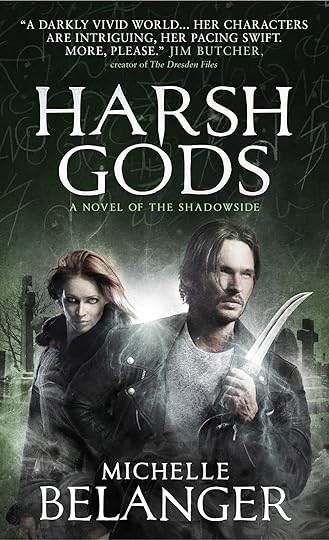Chuck Wendig's Blog, page 102
September 22, 2016
Yes, Virginia, Writing Is Too A Job
First came the article about the writer who wrote a novel and then went broke.
Then came the response at The Billfold, which said blah-blah something-something about how you can’t really make a living working as a writer because writer isn’t a job.
‘…but come the fuck on. Kafka, Dickens, Nabokov — they all had day jobs. Novelists have day jobs! Roxane Gay, who is busy and accomplished enough to be several people, still has a day job. Writers have day jobs because being a writer isn’t a job. Writing is a thing you can do if you like it! It’s a thing you might get paid for, now and again, if you’re good at it! But it’s not a job.’
*looks around*
*looks at self*
*looks at self writing*
*looks at self getting paid to write*
*looks at self getting paid to write full-time*
*looks at self inside writing shed which was paid for by writing full-time*
*grunts*
Writer is a job.
I almost feel like I should end it there.
WRITER IS A JOB, he yodels, then goes and writes.
Writing can be a career. It can be a hobby. An art form. A distraction. An exploration. Some get paid nothing to do it. Others, very little. Some make enough with it to do the work full-time. Sometimes “writer” is even a job title inside a company. If you work for a video game company, or for a movie studio, or for any kind of content creation company… nnyeah, yes, those people are writers. It’s real. They’re not unicorns. They’re not secretly mailroom attendants who were given the job title of ‘writer’ just to make them happy. Don’t diminish them. They are writers who write and they write for money. I get the point. I’m not saying you should quit your day job and expect the MONEY HOVERCRAFT to back up to your house and fire wads of cash into your garage with a cannon, but there’s money there. And occasionally, it’s very good money for the time you put in.
Being a writer does not mean you are also automagically at a job. Being a writer and making money does not mean it is your only job. I had a day job while freelance writing — until one day, I didn’t, because I was making enough as a writer. A lot of novelists and freelancers have day jobs, but that doesn’t mean writing fails to serve as a companion job. It’s like, just because I ate a meal at lunch doesn’t mean dinner does not also comprise a meal. If I have one child, I may also have a second one — the second one isn’t a pet or a robot. You can have two things. You can hold two truths. You can have more than one job, and writer can be part of your cabinet of professions.
No, it’s not easy. Duh. Obviously.
But a lot of jobs and careers are not easy to enter or maintain.
Most people can’t be film directors, or cartoonists, or professional bear inseminators. But there are those who can, and who do, and who get paid accordingly.
Writing is a job. And to suggest it’s anything other than that gives in to the persistent myth that writing is some kind of joy-fueled reward factory, where the writing alone is enough to feed itself. Where we pretend that starvation and sadness are implicit to the role, and that getting paid is so rare and so strange we can’t even call it a job or a career anymore. That’s dangerous. Starvation is not a requirement. Starvation is not sexy.
That’s not to say every writer must aspire to also make it their profession. It’s totally fine to do it as a hobby. No harm no foul if you do it just to do it, just as there’s no harm no foul if you inseminate bears just to do it.
*is handed a note*
Correction: you should not randomly inseminate bears. That is, according to my lawyer, “illegal.”
Whatever.
Point is, writing is a job.
It’s okay that’s it’s a job.
It’s okay when it’s not a job.
It’s okay that it’s a hard job.
It’s okay when you also have a day job.
It’s all fine.
The end.
Go write.
September 21, 2016
It Is Art That Will Help Us Survive
It’s a little… it’s a little fucked up out there.
Right now, outside my window, it’s calm. It’s sunshine and trees. It’s the last crickets of the season. It’s squirrels, and okay, the squirrels are not calm because the squirrels are losing their fucking squirrel minds, going gonzo over every acorn and hickory nut that falls from the trees, but even still, it lends itself to an overall picture of normalcy.
Looking outside, I wouldn’t know that everything is wrong, and people are on fire.
Or maybe it’s that people are wrong, and everything is on fire.
I don’t know. The squirrels, maybe they know. The yellowjackets know, because they are tuned into the coming of winter — they get cantankerous around this time, all pissed-off and sting-happy because they know that for they and their wasp pals, it is the ends of empire as the leaves drop and the snow lurks.
And if you look online, or at the TV, or at the news, or at whatever passes for “news” on TV, you’ll see — it’s just fire and wrongness all the way down. Everything is a poisonous shit typhoon, or feels like it. It’s the hottest year on record by a good stretch. Black Americans are being shot by cops, cops protesting POC’s right to exist with bullets and institutional racism. Many dangerous bacteria are becoming resistant to antibiotics, and now even gonorrhea has become resistant — worst of all, an entire mass of antibiotic-resistent gonorrhea is running for president underneath a PineSol-soaked clown merkin. And that presidential candidate represents, in a way, so much of what’s WRONG-AND-ALSO-ON-FIRE, so much of what got us here — he’s like a weaponized, animated version of all the bad policy decisions and septic social movements that have plagued us and dogged our heels and tried to hold us back again and again and again. Trump is a 300-foot wicker statue filled with Twitter eggs and Gamergaters and white supremacy and sleazy snake oil capitalism and tiny fingers cut off of inadequate men. That statue is now ablaze. It lights our way not to illuminate, but to blind us.
(Let’s just make sure it’s said now: if you’re the type of person voting for Trump, we aren’t going to have much in common except for an effervescent, yeasty disdain for one another. You’re supporting someone who wants to dismantle everything. Someone who wants something so simple as food regulations to be weaker than they already are. Something so simple as, “I don’t think it should be legal for people to sell me food with actual human feces in it,” is something with which this Naugahyde Buffoon disagrees and that he opposes. And that’s just the tip of the sanity he would endeavor to undo — the sexist, racist, anti-human, anti-love components of his non-policy policies are jaw-dropping on the daily. As Drew Magery says, “fuck you.”)
So, whaddya do?
What can you do to stave off that crushing feeling of being at too great a depth in the diarrhea ocean in which we’ve been floundering? How do you get a grip and keep the grip? The obvious solutions are there, and they’re tried as well as true: get off the Internet, turn off the TV, go fuck off in the trees and watch some squirrels. I don’t even know that I’m going to watch the debates. What would be the point? Hillary could literally vomit demon-spiders onto the podium and I would still be voting for her. We are not at a point in the election where I’m like, It could go both ways for me. It can’t, it won’t. She’s my candidate. I like her, and I also like not gently elbowing our nation and its people into a deep fryer bubbling with hate-fatand self-tanning lotion.
Still, it’s hard. This has been a year of spectacularly shitty shit. Every week we seem to crater once more, shattering the mantle yet again. Bowie and Prince, two of our mighty pillars, have fallen, and now there are too few to hold us back from the screaming chaos-void above our heads. It’s bad news meteors crashing one after the next after the next. It’s hard to escape all of it. Online especially, and being online is an increasingly vital part of our work, our lives, our loves.
Again I ask, so whaddya do?
Spoiler warning: it’s art that will save us.
In a way, I think it’s art that has always saved us. Not single-handedly, of course, but it affords us all a toe-hold on the sanity in a world gone mad, and in times of lessened chaos, it helps us get back to stable surfaces. It’s why, I think, invading armies and cultural warlords always want to tear down art. They want to gash away our toe-holds. They want to give us fewer ways to hold on, fewer ways to climb up and out.
But art — words, images, sounds, music, games, experiences — can give us things that the real world never can. Art can be an escape. Art can be secret truths nestled in a sweet burrito of fiction. Art can show us who we are and who we want to be, and it can give us the metaphors and thematic connections that let us understand our world in a bigger, weirder, more resonant way. We learn who other people are through art — it’s not just our stories we need reflected, but everyone’s. Art maybe won’t create empathy out of whole cloth, but it can stir it, it can stoke it, like breath blown against cooling embers. This is true for art whether you create it or absorb it. It’s doubly true for when you share it — when we say to others, you need this. When you say, this helped me cope, or this helped me understand. The act of art as a probiotic boost to our emotional and spiritual immune systems. Art as rebellion, revelation, renewal.
Making it, taking it, absorbing it, sharing it.
Like I say, it can’t happen alone. Art by itself won’t save the day. You still need to vote. You still need to speak out and signal boost. You still need to be active when you can be active, and sometimes fuck off into the forest when you need to fuck off into the forest. We still need to do things, to be love and loved, to try to create in the world the love for others that we also want to see for ourselves. But art lends itself to that.
I don’t have some grand call-to-action here. There’s nothing really profound here, no magic snap-of-the-fingers solution to sort it all out and get on with things. I just want to say, if this goddamn fuck-all of a year is testing your resolve to simply exist, I hear you. And to that I say:
Go read a book. Watch a movie. Stare at some paintings. Listen to your favorite song. Find art that challenges you and that calms you. Find art that agitates, then find art that sedates. It’s all okay. Sometimes we need to escape. Sometimes we need to escalate. Art can help us do both. Absorb it, and if you’re so bold, make some art, too. And when you’re done, share it. Spread it all around like tasty strawberry jelly. Connect with others through this art.
Tell the world and let the art flow, motherfuckers.
It may be the only way we stay sane enough to make it to 2017.
September 19, 2016
Here’s How To Finish That Fucking Book, You Monster
That book you’re writing is mewling again in the dark. It’s a half-formed thing — all unspooled sinew and vein, its mushy head rising up out of the mess of its incomplete body, groaning and gabbling about this life of misery it leads. Its life is shit because you haven’t finished it. It’s flumping along on stump legs, pawing its way through your hard drive, bleating for attention. It needs words. It needs plots. It needs resolution.
YOU MONSTER.
WHAT HAVE YOU DONE.
It’s okay. I’m here. I can help you.
CLICK THIS BUTTON TO GIVE ME $199.99 IN 78 EASY HOURLY INSTALLMENTS AND I WILL SHOW YOU HOW bleah okay fine I won’t charge you any money. I’ll do this for free. Because I like you. And because I feel bad for the ill-formed thing you call a ‘novel.’ And because I hope secretly you will respect my advice enough to one day form a cult of personality around me.
You wanna finish that book?
Here’s how you finish that book.
1. Stop complaining about it. I know, it’s hard. It’s easier to talk about writing than it is to actually write, isn’t it? And it’s extra-special-super-saucy-easy to get online and join with others who have joined the Aren’t Finishing Shit club, and it feels somehow productive to talk about not being productive. Trust me, I know. I’ve been there. I’ve done it. I’ve flopped about publicly and engaged in the illusion of productivity. But you gotta stop. I’m not saying you can’t vent about it — just vent after you’ve BARFED WORDS UP ONTO A PAGE.
2. Accept your limitations. You are not a perfect person. You are given over to frailties and foibles. Others have different frailties and foibles. Yours are yours, and others may possess privilege that you do not. (Also true: you may possess privilege that others do not.) That changes no part of the reality of how this happens: writing requires writing. It demands work. A little here, a lot there, whatever you can accomplish within your given time and considering your limitations. You can do it. Gotcher hands chopped off? Type with your nose.
3. Set your time, and defend it. You know your schedule. You know your life. Up at 6AM, work at 8AM, naked racquetball with Dave and Mary at noon, cocaine and Muay Thai kickboxing after work with Pedro and your pet kangaroo, Mister Knickers, whatever. You know your deal. It shakes out roughly the same way every day. Look at this schedule, find the gap, and FILL IT WITH WORDS. Maybe it’s every day for 45 minutes. Maybe it’s every Saturday for eight hours straight. Find the time. Then defend it. Defend it from everything. Anything that wants to sap your time and steal your opportunity to smash words into the chrono-fissure, you scream at it, LEAVE ME ALONE, TIME THIEF. Flail! Writhe! Take the time and own it.
4. Find your space, and defend it. Maybe you have an office. Maybe you gotta take up a corner of the dining room table. Or a table at the coffee shop. OR A LICHEN-ENCRUSTED ROCK IN THE DEEPEST TUNDRA. Doesn’t matter, as long as you can claim it and count on it for your writing endeavor. Go there. Write there. Anybody who wants to take your space, you wave a knife at them. You shake a jar of bees at them. Rub blood and bones in your hair and hiss at any who would dare to violate your WORD DISGORGEMENT BUBBLE.
5. Repeat after me: this is important. It’s important to you. It may one day be important to readers. Stories matter. Stories shape the world, and they do this one person at a time, from writer to reader. Don’t act like this doesn’t matter. This is something you want to do, so assert the thought your mind — and to any who dare challenge the notion! — that damn right, this is important. Give it priority. Lend it the weight of value. Emotional value. Intellectual value. Fuck You, Don’t Judge Me value.
6. Set a reasonable daily goal. Me, I write 2000 words daily, but I do this full-time. You, maybe you can write 350 words a day. Guess what? It still works. It’s still writing. It still counts. Nobody’s over your shoulder judging you about it, and if they’re judging you for not writing what they write, punch them in the ear and vomit hot lava on their supine form. Maybe it’s not about word count at all, but a chapter a day. Or one a week. Or one plot point to the next. I don’t care. Nobody should care. The only thing that matters is FORWARD MOTHERFUCKING MOMENTUM. One step at a time. One leap. One sprint. Find a reasonable goal and hit it regularly. And when you don’t hit that goal –
7. Don’t beat yourself up. You know what good that does? ZIPPITY SHIT NADA BUPKISS POOP NOISE NOTHIN. Shame and guilt and haranguing yourself are worthless. Shame is yet another way to feel productive, like, ah, yes, I’ve sufficiently punished myself, now with my inner thighs properly whipped bloody by this hickory switch, I may once more feel good about writing. Except it doesn’t make you feel good about writing, it just makes you feel bad about not writing. And feeling bad is dumb. You should feel bad about feeling bad. (Wait, that seems like a paradox? Whatever.) Momentum is not gained by hobbling yourself with guilt. Momentum is gained by recognizing the failure and then using it as a trampoline to jump way the fuck over it. “That thing I didn’t do?” you say to yourself, “Ha ha, tomorrow is now today and I will finish what I started,” and then you cartwheel over it with two machine guns and a sassy, sexy glint in your sassy, sexy eyes. Failure in this way is a thing to overcome — a hole to step over, not a hole to step into to fulfill some twisted sense of resentment and discipline.
8. Kill your fear of failure. Failure is amazing because failure is learning. This book may fail. It may never get published. It may get finished and suck moist, open sphincter. That’s okay. Even since getting published I’ve written three novels the world will likely never see because they failed. And I like that they failed because I use their crumpled bodies as a hill to get me higher next time, and each increase in elevation grants me a clearer view of what comes next. (Please read: Delilah S. Dawson on WHEN YOUR BOOK IS FATALLY FLAWED.)
9. Kill your fear of success. This is also a thing. I don’t know where it comes from or why it happens. Maybe it’s that you fear you don’t deserve it. Maybe it’s that you are afraid of what happens once it leaves your hand and goes to an agent or an editor. Success means being judged — by the industry, by readers, by reviewers. Poop on all of that. Do not entangle your current work in worries over success or failure. Do not ascribe it so lofty a judgment. Lean into the purity of the thing — the purity of doing, the purity of moving forward. Do not worry what is at the end of the road. Just walk the damn road and enjoy what you see along the way.
10. Divest yourself of ideas of quality. Quality matters in the end. Quantity matters in the beginning. Produce. Create. Write. Iterate. As I am fond of saying, that first draft isn’t just a zero draft, it isn’t just a vomit draft — it’s the beachstorming draft. It’s just you trying to land enough boats and enough soldiers on the sand that you can carve out a space to call your own. You’re just trying to advance the thing — one bloody, gory inch at a time. Quality? Fuck quality. Just get up the beach. You will rewrite history later.
11. Stop thinking about publishing more than you think about writing. Publishing is not yours to control. You don’t own it. You don’t shape it. What you own and what you shape is there on the page. Worrying about publishing at this point is like letting the horse out of the barn before you’ve even tied it to the cart.
12. Come to the page excited. Every day, find a reason to be excited about the draft. Maybe it’s a scene you want to write, or a line of dialogue, or a riveting revelatory plot twist. MAYBE THE WHOLE CHAPTER IS REALLY AN ACROSTIC POEM. I don’t know! I don’t care! Just find a reason to sit down every day and be geeked about writing.
13. If you’re not geeked about writing that day, write anyway. No, seriously.
14. End the day’s writing in the middle. Do not bring the word count to a satisfying conclusion. End it at a moment of tension or stress. Hell, cut yourself off mid-sentence. WORDUS INTERRUPTUS. Tomorrow, you’ll be excited to return and obsessively finish that thing you (also obsessively) chose not to finish.
15. Hunt, kill and eat a mailman. Mailmen are made of words. They deliver words every day to people. Hunt one down and devour him to consume all the words he has ever delivered.
15. (Okay that last one isn’t true I just wanted to see if you were paying attention. Let’s try again.)
15. Skip the boring parts. Just fucking skip them. Boop. Done. I mean, c’mon. You know when they’re coming. You can tell when you’re in the boot-sucking mire, because other dullards will be there, too, gargling in the dark as they sink into the muck. Skip it. Grow wings and fly above it. Hurry past the stupid stuff and get right to the exciting parts. Seriously, you’d be amazed at how freeing it is to decide willy-nilly, “This part I’m writing is boring the pants off me,” and then you just… stop writing it and hop-skip-jump to a much cooler part. (Actually, boring the pants off you is the wrong phrase. Because I’m rarely bored with my pants off. I think the phrase should be, “Boring the pants onto you.” Like, the work is so boring it made you get an accounting job somewhere where you had to wear gray slacks and eat gruel out of the company fridge.)
16. Forget your darlings and kill your distractions. You go to write, something distracts you. Phone. Social media. That bird you have in your pocket. Why do you have a bird in your pocket? Were you planning on eating it? Is it a sex thing? LET THE BIRD GO, WEIRDO, AND GET BACK TO WRITING YOUR BOOK.
17. Stop worrying about what everyone else is doing. What genre they’re writing, how many words per day, what advice they’re giving — just, nngh, meh, fuck it. Get shut of it. That includes any effluvium that comes frothing out of my mouth, too. If it distracts you, if it hobbles you, bin it and move on.
18. Have an outline. Or don’t have an outline. I don’t give a unicorn’s ugly butthole what you do — just make a choice and stick with it. The larger message here is: know your process. You know the things that work for you, so do them. And yes, that’s right, unicorns have ugly buttholes. Wretched cankers, those little poopers. Like a rotten little mouth spitting glittery dirt into a meadow. Everything about the unicorn is majestic and beautiful except that one part. It’s like their Achilles’ heel or something? I dunno. I didn’t make it up. It’s mythology. Don’t get mad at me, unicorn lovers. I’m just speaking truth to power.
19. Change processes that aren’t working for you. This isn’t politics. Nobody is going to accuse you of doing a flip-flop. (And by the way isn’t that a thing we want our politicians to do, within reason? To change their opinions when new information is received?) If something doesn’t feel right, or circumstances in your life have changed — then change what you’re doing. Adjust your writing time. Shift the process. Do an outline or don’t do an outline. Try new things to switch it up. Art is a chimera, man. You want to catch the weird-ass Pokemon called YOUR FINISHED NOVEL, sometimes you have to change your tactics in the middle of the hunt.
20. Take the exit once in a while. Writing is a journey. Driving is a journey. Sometimes driving means taking the exit — get off the highway, and find the backroads. Drive down the backroads, you might see some unexpected sights. You might see a weird little restaurant, or a pretty bridge, or some guy riding an elk hunting giant spiders with a flaming crossbow. I dunno. I’m just saying, you can see some shit out there. In fiction, you can be motived by sometimes taking a hard right turn off the expected narrative path. Take the exit, find the backroad. Also, someone please write a story about the elk-riding crossbow guy because I want to read it.
21. Fuck the fucking market. The market is unknowable. It is a cipher. Those who tell you what the market wants are not telling you what the market wants — they are interpreting the market the way an oracle interprets monkey guts. You’re better off writing what you love and writing it as well as you can, and hoping that the market will bear whatever it is. And hey, if you’re wrong, you’re wrong. But at least you wrote what you wanted. At least you mashed your heart onto the page and didn’t fail trying to second-guess what some cryptic industry wants from you.
22. Take controlled breaks. I write for 45-60 minutes and then tend to fuck off for 15 minutes. I time it. If I don’t time it, those 15 minutes will become three hours and then I’ll wonder why the sun is going down and why is my son graduating college and WHY ARE MY OSSIFIED BONES ERODING IN THIS MARTIAN WIND and whoa how did I get on Mars, I was supposed to be writing a book? Whatever. Take your breaks. Do things during these breaks that make you happy and avoid things that make you unhappy. If Facebook makes you unhappy, stop fucking looking at it. Delete it. Explode it. If looking at pictures of dinosaurs makes you happy, look at pictures of dinosaurs. I dunno. Masturbate. Eat a snack. Stare out the window. Then get back to work.
23. Reward yourself. Not just with breaks but with more happiness. Finish a day’s worth of writing? That’s worth something. I dunno that it’s worth like, a new car or a vacation, but it’s worth a piece of chocolate or something. Listen, we’re basically dogs, okay? We don’t do well with negative reinforcement, because then we learn to fear and hate the task even as we perform it. But we do hella well with positive reinforcement. Hack your dog-brain. Give yourself a treat, damnit. You deserve it, you cheeky poodle, you.
24. Shut up. Just… shut up. Tzzzt! Shh! Shush! Someone out there is saying, “But–” and I say, no. No! Stop. Just shut up. It’s okay if you don’t agree. It’s okay if none of this works. But truth is, you wanna write, you gotta write, and writing means finishing so go finish. Don’t tell me. Don’t yell at me. Prove me wrong. Make words come out of your parts. Use those GREASY LETTER-MASHERS you call fingers not to write me an angry email, but instead to write the book you aren’t writing. Trust me, the energy is far better spent writing the book, because I’m probably just gonna delete your email if it makes me unhappy.
25. Go right now and write. Right now. Go. Now. WRITE, YOU MONSTER, WRITE.
P.S. don’t panic
P.P.S. have a towel handy
P.P.S.S. you really are a monster, you monster
* * *
INVASIVE:
“Think Thomas Harris’ Will Graham and Clarice Starling rolled into one and pitched on the knife’s edge of a scenario that makes Jurassic Park look like a carnival ride. Another rip-roaring, deeply paranoid thriller about the reasons to fear the future.” — Kirkus Reviews (starred review)
Out now where books are sold.
What Fiction Can Do For The Writer And The Reader
The power of fiction is a slippery, elusive thing — what it provides is not scientific, and often ephemeral. But stories matter. Stories shape the world. And sometimes we don’t necessarily realize how it’s shaping the world — or how it’s shaping us as the writer and those who read what we put out there. Sometimes I get emails, though, about how a book of mine affects people, and that’s what starts us ON THIS GLORIOUS STORIFIED JOURNEY.
Let us begin.
[View the story “What Fiction Can Do For The Writer And Reader” on Storify]
Macro Monday Has Luminous Spines
It’s not the greatest photo I’ve ever taken, but really, I quite like it. Those are, of course, the spiny spines of the luna moth (Actias luna) caterpillar, spines that, should you touch them, will give you a nasty little passive sting for your intrusion.
If you want to see something really freaking weird, PEEP THIS:
BEHOLD THE MOUNTAIN OF FLESH
ALL HAIL THE SQUIRMLORD
BE CONSUMED BY ITS QUIVERING PILE OF TENDONS AND MEAT
Okay, fine, it’s not a mountain of flesh, nor is it a Squirmlord –
Those are the mouthparts of Zorak, our resident mantis (here is Zorak, posing for the camera):
In other, sadder news, the voiceover and animation artist who voiced and drew Space Ghost’s Zorak, C. Martin Croker, passed away, and that’s not cool. 2016, you are shit.
Anyway.
So, what’s going on? Well –
This coming Thursday, I will be at the new Emmaus, PA location of Let’s Play Books, and I will be talking about Invasive and Star Wars and really whatever else you want me to talk about. I will be bringing BUG-ENCRUSTED FOOD-STUFFS (entomophagy ftw), and I will also be featuring cupcakes from the best cupcake place from which I’ve tasted cupcakes: Sugar So Sweet, also in Emmaus. The cupcakes will not contain bugs, so you can thank me for that mercy. I’ll sign books. I’ll sign children. I’ll answer questions. I’ll try to get you to eat crickets. And so on. Come! Say hi! Thursday, the 22nd, at 6PM.
Now, behold: the Pelee Island Writers Retreat IndieGoGo campaign. Click that and you will see that it is a writer’s retreat on an island (!) in October 2017 which at different times will feature Margaret Atwood and, at the complete other end of the spectrum of literary shenanigans, me. But, you need to go, sign up, donate, if you want this to happen. You! Me! Margaret Atwood! Birds! Words! Probably swearing! I don’t know! Go sign up.
DID YOU SEE ME ON COOKING THE BOOKS WITH FRAN WILDE? YOU SHOULD. It’s me! And Fran! Talking about food and bugs and also there’s a recipe so go clicky.
Also, three new reviews for Invasive:
Awesome author Harry Connolly talks about the book a little: “Terrific. Wendig has a way with words, which is not to say that his writing is delicate and lovely, but that it’s very inventive, specific and filled with vitality.” (Thanks, Harry!)
At Skulls in the Stars: “The broad strokes of Invasive may seem familiar to those who have read the works of Michael Crichton, in which there is often a remote high-tech research facility in which the experiments go horribly wrong. First I should note — and I think this is vague enough to not be a spoiler — that there is a dramatic, indeed catastrophic twist about 2/3rds of the way through Invasive that is surprising and very different from anything I remember of Crichton. There is a bigger difference between Wendig’s writing and Crichton’s writing, however…” (read the rest to find out what that is)
And at Ian Hiatt’s blog: “So I finished INVASIVE within 48 hours of starting it. I highly recommend doing this. It’s not that the book is so good as to warrant dangerously speedy devouring. It is—but my warning comes from a place of squirminess. You don’t want your mind resting on the main stars of this book. Ants. Lots and lots of ants. Thousands. Probably millions.”
(Anyway, point is, hey, yay, Invasive: Indiebound | Amazon | B&N)
Two more things, then I’m out:
First, my NYCC schedule is mostly done baking, and I’ll post it soon as it is.
Second, question to the crowd — I’m considering closing up shop on the Flash Fiction Fridays. They’ve been… less trafficked recently and I wonder if it’s maybe time to quietly close the door on them. (I didn’t post one on Friday.) Though, sometimes summers can be quiet, too, so maybe we’ll be ramping up more soon? Let me know!
September 14, 2016
Ambien Tales
So, yesterday on Facebook I asked about Ambien, given that my doctor had prescribed literally a few pills of it as kind of an “emergency, break glass when needed” insomnia fix.
Well, after reading the thread on Ambien, I think it scared my mind straight or something since I got a great night’s sleep last night.
One of the side benefits of that thread was the wealth of completely bizarre stories from those who have experienced side effects from it. I mean, some of them were eye-goggling. (“I woke up with a loaded gun in my bed.”)
I figure, hey, why not bring that out into the open?
If you have interesting AMBIEN TALES to tell, well, hey, do tell.
*leans forward to listen*
*face melts*
*bees exit new face holes*
*bees all buzz together GO TO ZZZLEEEEEEP*
September 13, 2016
Jason Arnopp: Certainty In The Social Media Age
Ah, dear Jason Arnopp. Satanist. Sexual healer. 30 squirrels in a human suit. And now, an author. He’s gone ahead and written a crackingly funny — and scary — book, The Last Days of Jack Sparks. It’s kind of like if you took a found footage horror movie and turned it into a book except made it as hilarious as you did horrific? It’s really quite brilliant. Anyway, Jason wanted to come by to talk about some stuff, and since he has those pictures of me, I decided to let him.
* * *
If there’s one thing I’m certain about these days, it’s the glut of certainty in this world.
My novel The Last Days Of Jack Sparks started life with the idea of a guy who becomes obsessed with tracking down the makers of a creepy YouTube video. Sometimes isolated notions like this resemble ice floes, spending years adrift in search of a connection. For two years, I didn’t know who the obsessed guy would be, until finally, the arrogant celebrity journalist Jack Sparks was born from something I noticed about social media.
As one character notes in the novel, you never see anyone on Twitter say, ‘I’m undecided on this issue – let me come back to you once I’ve had a chance to properly think it over!’ Nope, we all dive straight in, don’t we, to nail our colours to any given mast. And I’m curious as to why that might be.
Let’s clarify what we’re talking about here – or rather, what we’re not. Clearly, having right-minded morals and values (aka not being an asshat) is important. Most of us naturally wouldn’t have much time for someone who questioned whether various prejudices were good or bad. Neither am I talking about actual facts, which you either know or you don’t.
So we’re talking more about issues for which there is no single answer, and often no way of gaining any definitive closure. From God to gun control to Ghostbusters to the truth about what happened to Malaysian Airlines’ Flight MH370, the fact that everyone has an opinion isn’t so much the fascinating thing here. What fascinates me is our apparent reluctance to express uncertainty. To occupy that bewildered middle ground. Why? Why has it become almost taboo to appear uncertain or undecided about any given topic?
Here’s one answer: we’re all broadcasters now. We all have our own cyber-platform, with a number of viewers theoretically open to what we’re putting out. So when we think of ourselves as broadcasters vying for attention bandwidth (and the resulting dopamine hits, which we underestimate here at our peril), it’s easy to assume that our audience will find shiny granite-hewn opinions far more interesting than namby-pamby uncertainty. Received wisdom suggests that people are more likely to show up for news and views than someone scratching their head or sitting in cross-legged contemplation.
Furthermore, a kind of race memory assures us that strong leaders make strong decisions. If we buy that logic and crave respect, it follows that we need to be seen to be assertive. Even if it means making a situation seem more binary or simplistic than it really is, as long as we deliver our vital hot take, that’s surely the priority, right? Hmm.
Perhaps another reason we rush to serve up a steaming slice of opinion pie, is that uncertainty creates unease. It leaves items in our brains labelled Action Required. Unticked items on our mental to-do list. Deciding what we feel and believe ASAP helps to clear our psychological decks, which are already cluttered enough on a daily basis.
On a very obvious level, uncertainty can be downright scary. In 2016, it’s easy to see the world as more chaotic than ever before. There are strong arguments against this. Plenty of folk maintain it’s less chaotic than before and internationally we’re actually more united than ever, in almost every sense, but an understandably widespread sense of unease prevails nonetheless. Faced with such perceived levels of chaos, perhaps we feel the all-abiding need to cling to rock-solid views, even if those views might only unhelpfully spawn more fear (“Hey everybody, we’re all fucked! KTHXBYE”)
It’s no coincidence that we find the most certainty clustered around the human condition’s biggest question mark of them all. We have no idea of what happens to our spirit when we die, or even whether our spirit is a thing. And yet endless millions get in line to place their bets. They stack their chips on the roulette table, even though the wheel won’t be spun till they stop breathing. I understand and respect anyone’s right to place such bets, but it’s an interesting phenomenon – or at least, it is until seemingly irreconcilable certainties clash and people die, at which point it becomes deranged.
Even people who don’t believe in a creator or an afterlife, they feel the need to place their own bet and share that with the world, sparking whole new certainty wars. Me? I’d love a planet on which everyone just lounges around, shrugs and says, ‘Ah, who knows? Let’s play Doom.’
In The Last Days Of Jack Sparks, avowed non-believer Jack regularly clashes with people of faith via social media. The man doesn’t seem to have an undecided bone in his body, and yet his friends and family alike are mystified when he sets out to write a whole non-fiction book debunking the supernatural. Could it have any connection with Jack’s older brother Alistair having locked him in a dark room at the age of five? Only Jack’s labyrinthine mind holds the answer, and it’s no spoiler to say that the story takes him from a place of certainty to an altogether different place… and ultimately death.
My friend John Higgs (whose own books like Stranger Than We Can Imagine: Making Sense Of The 20th Century are must-reads) introduced me to the counter-culture icon Robert Anton Wilson. Not in person, sadly, since Wilson died in 2007. The man would warrant a whole post in himself, but when it came to (un)certainty he popularised two concepts that appeal to me greatly and seem relevant here.
The first concept was the reality tunnel. A term originally coined by Timothy Leary, this means that we all see reality in our own unique way, filtered through our beliefs and experiences. We’d do well to bear this in mind, next time we try to pass our opinions off as facts. The second concept could also be considered a tonic for the internet age: multiple model agnosticism. This doesn’t just apply to God but to everything. It involves acknowledging that we see the world through our own reality tunnels, while remaining open minded about switching to any number of new tunnels. Whole new grids of belief, further down the line. Whatever feels right.
If the internet so often seems to say I know I’m right, Robert Anton Wilson was saying I know I’m wrong. His whole self-deprecating attitude made him so diametrically opposed to Jack Sparks that it felt spectacularly right to start the novel with a Wilson epigraph: ‘If you think you know what the hell is going on, you’re probably full of shit’.
So many readers seem to find Jack Sparks as compelling as he is infuriating. Like some kind of existential duck, Jack appears perfectly calm on the water’s surface, while his legs swim furiously away underneath. Perhaps it’s appealing for us to explore the less desirable traits that social media might nurture in us, but to do so through Jack, without having to interrogate ourselves too closely.
All high-falutin’ philosophical considerations aside, of course, the idea that we have no clue what’s really going on in the universe works nicely in a novel that aspires to scare the ever-loving Christ out of readers. But the next time we don’t know what the hell is going on, we might consider plucking up the courage to say so. For every one person who thinks less of us as a result, I’m totally certain there’ll be ten who think, ‘Thank God it’s not just me’.
Jason Arnopp: Website | Twitter | Facebook
The Last Days Of Jack Sparks: Amazon | B&N | Indiebound
September 12, 2016
Macro Monday Is Not A Macro But Surly Owl Doesn’t Care
This owl knows that it is Monday, and is accordingly surly about it.
VERY SURLY.
Also, dubious.
Super dubious.
(I have more macros coming soon — got a camera full of ‘em, but need to process the photos.)
Anyway.
So, hey, hi, how are you?
Here’s what’s going on in this neck of the woods:
- Our tiny human is now in kindergarten. He does not approve of this turn of events and would much rather spend his time staying at home and playing LEGO thank you very much.
- I’ve been battling sudden bouts of insomnia, as if I somehow fucking forgot how to sleep? And goddamnit, I love to sleep. Sleeping is the best. It’s weird when autonomic processes become hard — it starts to feel like something is broken, because, hey, sleep is obvious and easy. I’VE BEEN TRAINING MY WHOLE LIFE TO SLEEP. And suddenly my brain is like, “Hey, it’s night-time, is this a good time to talk?” And then my heart races and the room feels hot and woo, boy. It’s anxiety, probably and maybe a little bit of reflux, too, and I don’t know if it has a source or it’s just a shift in things and the schedule with B-Dub now in kindergarten. I’m sure it won’t last and I’ve had some luck the last couple of nights changing up my routine a bit, so we shall see. (If any of y’all out there deal with insomnia, shout out in the comments. Got tricks to deal?)
- Next Thursday, I’m at Let’s Play Books! I’ll bring cupcakes! And, cough cough, some edible bugs. NO, the bugs won’t be on the cupcakes. (Or will they?) Let’s Play Books is a marvelous kids’ (or mostly-kids’) bookstore in Emmaus, PA. They’re changing locations so I’m doing an INVASIVE-slash-STAR WARS event in support of their grand reopening and you should totally come. 9/22, 6PM. Be there or be covered with ants.
- The following Tuesday, 9/27, I’ll be at the Rittenhouse Square Barnes & Noble in Philly with YOUR PAL AND MINE, Fran Wilde! She’s there launching her newest, Cloudbound. I’ll be there to sign books and give Fran dubious surly owl looks for her Knock Knock jokes. 9/27, 7pm, details here.
- HEY LOOK AT THIS COOL PANEL FROM THE FORCE AWAKENS, ISSUE 4
- Hey, a very kind review of Invasive has popped up at BiblioSanctum:
“I loved Hannah as a protagonist. She’s complex, well-written, and sympathetic. Raised by parents who were diehard survivalists, Hannah grew up seeing the end of the world behind every corner. From a young age, she was taught the skills to prepare for any possible doomsday scenario. In spite of her upbringing though, or perhaps because of it, Hannah chose not to focus on the end, but instead decided to pursue a career related to studying the future. Her current relationship with her parents is complicated, strained. She maintains that human advancement will either lead us to great things, or destroy us all. As a character, Hannah is shaped by this duality, and it’s also a recurring theme that pops up throughout the novel.
The story is also tight, fast-paced, suspenseful. It’s very reminiscent of Michael Crichton, but Invasive also carries all the elements that make it a Chuck Wendig novel, with its dark humor, snappy dialogue, and hard action. I had a great time with this book, so much so that this might have just become my favorite work of his after his Miriam Black series. And if you know how much I love those books, you know I would not say something like that lightly.”
- My NYCC schedule will be formalized soon, I hear.
- I have a handful of other COOL THINGS to share, but can’t share them yet or assassins will take my head as punishment. So, keep your grapes peeled.
- Buy INVASIVE or your flesh will be colonized by ants. You can grab it here:
Indiebound | Amazon | B&N
September 9, 2016
Flash Fiction Challenge: Genre-Flip An Iconic Scene
Here’s a bit of a noodle –
I want you to take a scene from, mm, let’s go with a well-known story. Ideally, it’ll be something we’ve all seen or read — so, Die Hard, Lord of the Rings, Star Wars. Even better if the scene you pick is something iconic — the showdown between John McClane and Hans Gruber, the OH SHIT YOU’RE MY EVIL SPACE DADDY scene between Luke and Vader.
Take that scene.
And rewrite it.
The trick is, rewrite it with a new genre.
What genre it ends up with is your call. Star Wars as a horror film? Die Hard in an epic fantasy context? Your call. You can change the characters and situation appropriately — though again, ideally it becomes something iconic and recognizable even with those changes.
Write it down, ta-da, that’s this week’s challenge.
Length: ~1500 words
Due by: September 16h, Friday, noon EST.
Post at your place.
Drop the link below.
Go.
September 8, 2016
Michelle Belanger: Five Things I Learned Writing Harsh Gods
The last thing Zack Westland expects on a frigid night is to be summoned to an exorcism. Demonic possession, however, proves the least of his problems. Father Frank, a veteran turned priest, knows Zack’s deepest secrets, recognizing him as Anakim, an angel belonging to that hidden tribe. And Halley, the girl they’ve come to save, carries a secret that could unlock a centuries-old evil. She chants an eerie rhyme…
“HANDS TO TAKE AND EYES TO SEE.
A MOUTH TO SPEAK.
HE COMES FOR ME.”
As Zack’s secrets spill out, far more than his life is at stake, for Halley is linked to an ancient conspiracy. Yet Zack can’t help her unless he’s willing to risk losing his immortality—and reigniting the Blood Wars
* * *
With over two dozen non-fiction books under my belt, you’d think fiction would come easily – it’s all words, right? – but you’d be dead wrong. Maybe it’s my particular quirk, but crafting fiction is an incredible challenge, one I delight in with each new installment of my Shadowside Series. I’m Michelle Belanger. You may have seen me on TV. I write a lot of books about ghosts and demons and other spooky things. Here are a few of the lessons that I learned while writing my latest novel, Harsh Gods:
You think you have one main character? Think again.
The Shadowside features Zack Westland, linguist, gamer geek and avenging angel. Told from his point of view, the series explores the complex web of intrigue and betrayal built from the constant wrangling of his extended family – all angels, all incarnating among humanity through a variety of methods. (note: these are not your grandma’s angels).
Obviously, Zack’s my main character – except for when he’s not. When I started the first few chapters of Harsh Gods, things just weren’t moving. Sure, there were reasons. Zack had a rough time of it in the first book, Conspiracy of Angels. He lost memories, allies, and Lailah, a woman he might have loved.
Harsh Gods opens with Zack mopey as fuck, binge-gaming in an effort to keep his depression bay. And I could not get the guy to talk. Enter Lil. In the first book, she’s an avowed frenemy, only working with Zack to seek her missing sister, Lailah. Brutal, efficient, and utterly unapologetic, she doesn’t merely jump rope with the line between hero and villain. She plays double-dutch with it.
Writing Lil, I had planned for her to make appearances now and then, but I’d thought of her more as a sidekick than a main character. Boy, was I wrong. The minute she popped onto the screen in Harsh Gods, everything started moving lickety-split. Zack’s depression remained an issue – I’d be remiss if I let the guy just traipse blithely through all the crap he endured in book one without some consequences – but Lil made it work. She kept Zack on his toes and didn’t give him a chance to drag the action down by moping. More than that, she got him talking, which POV characters can do too much of, but Zack really needed the motivation to open up. After that first scene where Lil shows back up, I had to admit that I had two main characters. It wasn’t like Lil was giving me any other option.
Not every back story get seen right away.
I have a thing about side characters. Specifically, I cannot stand to have them be mere walk-ons. One dimensional cardboard cut-outs with the title, “Man with Gun” are fine in TV scripts. Maybe they’re not even fine there, but I can say for certain that I don’t like them in my writing. If my main players pass someone on the street, that someone has a story living in my head. I almost can’t help it – I resonate too deeply with Koenig’s word “sonder” from the Dictionary of Obscure Sorrows. When a world burgeons with so many stories, there is a driving temptation to tell them all. But you just can’t – not all at once.
My best example of this is the character Sanjeet. In my notes, she started out as “random white dude sent to deliver a message,” but the instant she became Sanjeet, she grew into something else – a whole person with history and depth and a story that burned to be told (I’ll talk more about my decision to change her from “random white dude” in a minute).
There is a scene on the cutting room floor where Zack presses Sanjeet into telling her story – at least some of it. When a few points of the action changed, that scene had to be cut. Chronologically, it no longer fit. So Sanjeet’s whole backstory gets relegated to an off-hand comment about why she doesn’t really like Zack at first glance. Even that comment is obscure at best. I worried about that as I was going through the edits, because, for me, it left so much dangling. But on the final few read-throughs, I realized that it not only worked, it guaranteed that we would see more of Sanjeet in the future. Her story didn’t have to spill across the page at her first introduction like some rote recitation of a character sheet. That story was a seed planted with an off-hand line, one that should be allowed naturally to grow and unfold.
At least 70% of your world-building will never make it to the page, and that’s OK.
With my name on titles like The Dictionary of Demons and Sumerian Exorcism, you know I like my research – possibly a little too much. For decades, I’ve immersed myself in the study of angels, demons, and beings that dance the line between, reading with the eye of a mythologist, rather than a theologian.
For the Shadowside Series, this manifests as worldbuilding.
I like worldbuilding. A lot. Inventing languages, crafting pantheons – blame my days as a game master for Vampire: the Masquerade and D&D. There are whole mythic cycles I’ve written about the angelic tribes as groundwork for the Shadowside books, and these explore key details like when the tribes arrived, what cultures they influenced, and how immortal spirits can take form in the physical world in the first place. Their names, their powers – even the fact that they arrange themselves in tribes – all stem from my study of Biblical and related history.
And no one but me needs to have access to that material, because Zack is ignorant to all of it. He has to be, for there to be relevance to the conspiracy at the heart of the series. The Shadowside books earn their label of Urban Fantasy, especially with how thoroughly some plot-threads are wound up with the city of Cleveland, but the books are also mysteries, and Zack’s quest to solve those mysteries is the real drive behind the action.
All those tales of the tribes’ mythic past – it’s tempting to find some way to squeeze them into the books. But they don’t need a place in the spotlight. They’d clutter the action. Who wants to read a book that looks like the Bible got gene-spliced with Encyclopedia Britannica, anyway? It’s taken me until Harsh Gods to fully make peace with leaving them out. The stories are things written for me. As the writer, I need to have all those details in my head. They are architecture and foundation. But the best way for those details to come out is not through unwieldy info-dumps but through light brushstrokes adding light and shadow to each character.
Just because it’s obvious to you…
This lesson played out as a fun exchange with my editor. There is a scene in Harsh Gods where several minions of the Big Bad have gotten their hands on hunting rifles. These rag-tag snipers are stationed high up on a tower, and they don’t expect company to ambush them by dropping out of the sky. Too bad for them – on the Shadowside, Zack can fly. As our hero pops back over to the flesh-and-blood world, a couple of the rifle-bearers get off their one shot, then Zack closes the distance and they resort to using the rifles like clubs.
That scene made perfect sense to me. My editor did the digital equivalent of spilling red pen all over it, dropping comments into the document asking why they didn’t try shooting a second time. And at first, all I could think was, “They’re single shot rifles. How the hell are they supposed to reload in the time it takes Zack to get into melee range?”
Which gets us to my first mistake: I assumed, because I knew about this type of rifle, the answer would be obvious to everyone else. I don’t consider myself any kind of expert on firearms, and yet, growing up in rural Ohio, I’ve had a good deal more passive exposure to gun culture than many, and certainly more exposure than I ever realized. Living in the States, it’s hard not to absorb at least some gun-knowledge through sheer osmosis, but I also associated closely with an uncle who was a police officer and a great-uncle who had a suspicious number of stories about the Irish equivalent of the mafia in Cleveland. They both talked guns, often. As a little kid, I didn’t think I was soaking up this information, as they were rarely talking to me, but exposure was enough. And because the knowledge was acquired passively, I failed to realize that it wasn’t common to everyone.
My second mistake was failing to write even one line that demonstrably showed the reader why the characters made the choice to abandon their guns as firearms and instead wield them like clubs. As writers, we make countless decisions to steer the action, but unless the reader sees some evidence for the characters’ decisions, reasons clear to us come across as muddy, erratic, or pulled fresh from our sphincters.
Rightfully, my editor called me on it. Which leads to my third error in this extended object lesson. My initial response at getting called out was to bristle, rather than thank Steve Saffel for looking out on my behalf. It is incredibly easy for writers to become blinkered to the gaps in their work, and this is why editors and beta readers are essential. Someone with distance from the manuscript is far more likely to catch those omissions, so we can go back and show clearly how things in the story got from guns as firearms to guns as fancy sticks.
Always question familiar tropes.
This is the story of how “random white dude” became Sanjeet. I told you I would get to this, but I saved it for last, because it touches on an issue weighing on a lot of peoples’ minds right now: diversity. Let me be clear, this is not a call for people to play Diversity Bingo, and if you do that just because you think it earns you points as a writer, it’s the equivalent of giving compliments with the expectation of earning affection. As a writer, you should consider diversity because the world we live in is diverse, and good fiction is woven from the stuff of reality. This is also a consideration of how popular culture molds our imaginations without our ever being aware of it. And for me, that revelation came together in a galvanizing way through the character of Sanjeet.
Before outlining the action of a book, I often scribble notes – character sketches, snippets of key scenes, the occasional bit of storyboarding. During this process for Harsh Gods, when I knew the story started with Father Frank reaching out to Zack for help, I ran into one big problem: in book one, Zack not only lost his phone, he also lost any memories relevant to things like his email. Any of his old contacts, outside of Remy, Sal, and Lil, have no way of getting in touch with him. More specifically, they could be calling and leaving emails, but unless they knew his address and boldly walked up to the front door, Zack wouldn’t even know thy existed.
As the action opens up, Father Frank is busy with Halley, so he needs to send someone to collect Zack. And in my notes, this person is first given the name Mike Beale. He’s as interesting as cardboard – his sole existence was as messenger boy. Of course he had a little back story – lay person at the Church, helps Father Frank out now and then. THE END. I wanted to get this Mike dude in and out of the action so fast, I considered having him get knocked on the head during the book’s first fight scene.
That is boring. Boring and lazy. And shortly after writing those notes, I saw that.
So I asked myself, “Who is this character really? Why does he have to be a guy? For that matter, why does he have to be white? Are there reasons? Do those reasons have anything at all to do with his character or the plot?”
None of Mike Beale’s projected qualities had any bearing on the plot.
I realized, in Mike Beale, I had conjured the clone of every bit character seen on practically every show imaginable. That television cliché – the extra who walks on, says maybe one line, probably gets whacked, and then only appears as “random white dude” in the credits – had wormed its way so thoroughly into my imagination that when I groped for a non-essential character, “random white dude” was the first thing my brain spat out. Mike Beale existed from sheer ubiquity, like the O of a condom worn into the leather of a wallet.
I didn’t want that. Specifically, I didn’t want a character to exist simply because it was easier than considering an alternatie. So I returned to my series of questions.
Who is this character really?
Someone helping Father Frank.
Does he have to be a guy?
Nope. No reason.
So why not a girl?
Sure, no reason she can’t be.
Why is she working with Father Frank?
Maybe she’s his secretary – and I stopped myself right there, because that answer, as much as “random white dude,” came purely from familiar portrayals. In that moment, I got a conscious glimpse of all my media front-loading. I don’t mean anything as heavy-handed as propaganda. That requires too much effort. The main reason we see the same tropes again and again is the simple and very human refrain, “But that’s how we’ve always done it.”
Except that’s no answer at all. If we fail to check our assumptions, nothing will ever change. And the world has changed around us, regardless of how it is currently portrayed in sitcoms, in movies, and in far too many books.
So, I asked the character, Who do you want to be? And I got Sanjeet, this kind of shy college kid with Hipster-framed glasses, long black hair, and an event in her past that drove her to seek self-defense classes – only she couldn’t afford to keep going, because she helps support her little brother. Father Frank volunteers at the dojo, so they worked out a trade. She’s not Catholic like Father Frank. She’s Sikh, and as part of that, she keeps this image of the warrior-saint Mai Bhag Kaur in her car to remind her that she can be both strong and brave.
All of that, because I asked, “Why this random guy?” and was open to answers that went beyond what was familiar to me. Sure, Sanjeet required more research. She’s only a bit character, but her presence meant some cramming on the Sikh faith – whether or not she’d approve of an exorcism, how she might respond to Zack because of her beliefs, and exactly why she has known violence in her past. But now, that character jumps off the page. She’s given me a story that demands to be told. And I’ve learned that easy answers lead to familiar places, but there’s a point where familiar stops being interesting.
Michelle Belanger: Website | Twitter | Facebook













